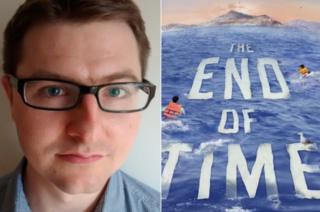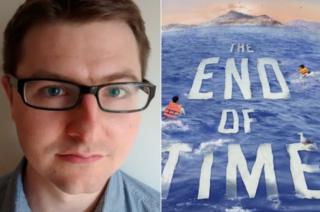Gavin Extence: Sheffield author on his Syrian refugee novel
Gavin Extence’s fourth book The End of Time follows two Syrian teenagers on their journey to the UK. …

 Image copyright Alex Extance/Hodder & Stoughton
Image copyright Alex Extance/Hodder & Stoughton Author Gavin Extence has previously tackled topical issues such as euthanasia, mental health and financial greed in his own witty way. His fourth novel The End of Time follows two young Syrian refugees and their journey to the UK, with a little help from an Iraqi alcoholic in pink flip-flops.
Alix Extence was desperate to get her despondent husband out of the house after a hoard of publishers had rejected his first novel.
So she signed him up to teach English to foreign nationals in their home city of Sheffield, hoping that would get him out of his slump.
It was at one such class that Gavin Extence met Zeyn, an Iranian refugee who, in a five-minute conversation, explained how he had fled Iran for the UK to seek asylum, including swimming across the Aegean Sea from Turkey to Greece.
“It was eye-opening,” Extence says. “I was astonished. I went home and started looking at maps just to see how it could be done.”
Extence’s initial literary rejections were eventually followed by Hodder & Stoughton publishing The Universe Versus Alex Woods in 2013, The Mirror World of Melody Black in 2015 and 2017’s The Empathy Problem. Extence remembered his brief chat with Zeyn, and it inspired his fourth book, The End of Time.
He does not know exactly where Zeyn swam, but in The End of Time 19-year-old Syrian Zain and his 14-year-old brother Mohammed swim about 1.2 miles (2km) to the Greek island of Samos.
There they meet a man called Jesus, an alcoholic Iraqi who is trying to get to Germany to meet his long-lost daughter.
Jesus, who wears pink flip-flops throughout the long journey through Europe, sees himself as the brothers’ guide, both spiritual and geographical. But his alcohol dependency and otherworldly attitude make him more of a hindrance.
“It’s the Gollum dynamic,” Extence explains, referencing the Hobbit and Lord of the Rings character who is torn in two by innate goodness and dark desires. “He is untrustworthy, unreliable and a hindrance, but he is also endearing.”
The trio make their way across Europe and ultimately find themselves in the Jungle, the notorious camp and gathering point at Calais for migrants hoping to get into the UK.
The book was fuelled entirely by online research, with Extence spending hundreds of hours in his attic office reading articles, scouring photographs and watching videos.
“With two young children at home I couldn’t spare the time to actually go to the places in the book, but I wanted to be as accurate with the detail as I could,” he says.
“It’s different from even 10 years ago because while we still have the main news sources, we also have so much more citizen journalism. There are videos shot by volunteers and the refugees themselves – so much more information directly from the scene that watching it you almost feel like you are there.”
The risk with writing topical books is the topics can become outdated. “Sadly the plight of refugees is still topical and I think it will be for a long time yet,” Extence says. “The growing refugee situation is absolutely a response to inequality and hoarding of resources, and it’s going to get worse.”
The topic may be Extence’s way in, like euthanasia became the issue of his first novel The Universe Versus Alex Woods, but for the author the main priorities are “story and characters”, with “everything else coming second”.
But political awareness did play an increasing part in The End of Time, he says. “A book should stand on its own and not rely on a topic, but I am making a political point in a way.
“There was a narrative in the news and politics about these refugees being a ‘swarm’ and an ‘invasion’, which dehumanised these people. I wanted to look at the human beings involved. I want to show these people are all individuals with their own stories, many of which are harrowing but also inspiring.
“It’s that cliché about one million people being just a statistic. It’s the individual stories and images that stick with you.”
Now, some seven years after his wife got him out of the house, Extence has already started work on book number five.
“This one will be a lot closer to home,” he says. “I’m writing about a teenage girl who has autism and is also having to cope with the death of her mother. A lot of the books about autism focus on it from a male point of view, but it can be a very different experience for females so I wanted to explore that and tell that side of things.”
The author starts work in the morning and tries to write for a set number of hours, as if he was in a regular workplace. “It’s one of the good things and bad things about writing or being self-employed – there is not a very clear line between time on and time off work,” he says.
“I enjoy it, although I do get massively distracted when I’m working, like I’m in a state of daydream. My wife has come in, for example, and found I have left the milk in the sink rather than the fridge.”
Although he tackles what might seem like heavy subjects, Extence is keen to inject warmth and humour into his work. “The book is not doom and gloom,” he says.
“It’s the bits that do not make the headlines, the human responses to these issues, people just getting on. The unsung heroes, essentially.”




